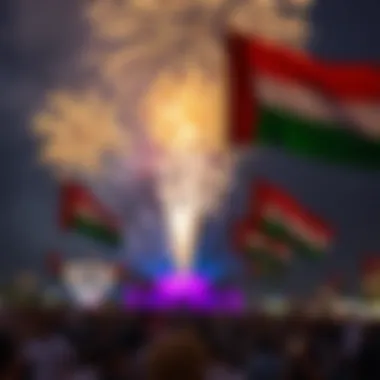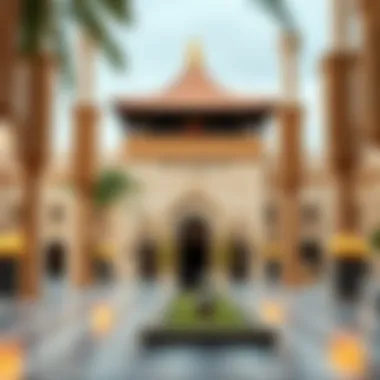Public Holidays in the UAE: Insights and Impacts


Intro
Public holidays in the United Arab Emirates are not just pauses in the business calendar; they are gateways into the cultural and historical fabric of the nation. These days off are steeped in tradition, reflecting the UAE's rich heritage and the shared values of its multicultural population. Each holiday offers a unique insight into the local customs, alongside implications for both residents and investors.
As you explore the public holidays observed in the UAE, you'll find that they serve as key markers not just for the passage of time, but also for economic patterns. Understanding when these holidays occur helps investors tailor their strategies, while residents can better appreciate their significance in everyday life. In this comprehensive guide, we will unpack the annual holiday schedule, look into the origins of each celebration, and analyze how these days affect various sectors, particularly real estate and local businesses.
With a range of observances from national celebrations to religious observances, this guide aims to equip those interested in living or investing in Dubai with a keen understanding of what these public holidays mean in both a cultural and economic context. Each section will delve deeper into the relevance of these holidays and how they resonate within the ever-evolving landscape of the UAE.
Prologue to Public Holidays in UAE
Public holidays in the United Arab Emirates are more than just days off from work. They are an integral part of the cultural fabric and social identity of the nation. For those unfamiliar with the local customs and practices, understanding these holidays can provide profound insights into the Emirati lifestyle, values, and traditions.
The UAE's public holidays are a blend of Islamic and national observances, reflecting both religious significance and the celebration of heritage. This duality not only emphasizes the country's Islamic roots but also showcases the pride in its history and development as a modern state. With an ever-growing expatriate community, knowledge of these holidays is essential for investors, homebuyers, and anyone looking to immerse themselves in the local culture.
Importance for Residents and Visitors
Being aware of public holidays is crucial in planning everyday life. For residents, it can affect work schedules, school calendars, and social events. For investors and business owners, understanding these dates influences commercial strategies and potential market fluctuations. For visitors, aligning travel plans with these holidays can enhance their experience, allowing them to participate in vibrant cultural events and traditions.
"In the UAE, public holidays offer a window into the heart and soul of the nation, where tradition meets innovation."
The holidays serve as reminders of the collective memories and aspirations that have shaped the UAE's identity. For instance, National Day is celebrated with fervor, marking the unification of the emirates, while Eid al-Fitr and Eid al-Adha are moments for spiritual reflection, family gatherings, and community unity.
All these elements underscore the importance of public holidays in the UAE. Understanding them enriches one’s experience, whether as a resident navigating through daily life or as an investor analyzing market trends. This guide aims to provide a detailed exploration of these holidays, shedding light on their significance and practical implications. In a dynamic location like the UAE, knowledge of public holidays is not just informative; it's essential.
Overview of National Holidays
When delving into public holidays in the UAE, it’s paramount to understand national holidays, as these are the bedrock of the country’s cultural and social fabric. National holidays serve as a reflection of both historical significance and shared values among the diverse population of the UAE. Recognizing these holidays offers insights not only into the United Arab Emirates' rich heritage but also into the lifestyle it promotes.
These occasions provide a break from the everyday hustle and bustle, granting residents and visitors the opportunity to engage more deeply with the emirate's culture. They also highlight the UAE's unique blend of tradition and modernity, where ancient customs coexist with contemporary lifestyles. In an area known for its rapid development, these holidays remind everyone of the importance of heritage.
Benefits of Understanding National Holidays
- Cultural Awareness: Gaining insight into national holidays allows both locals and expatriates to appreciate the cultural nuances and values celebrated within the community.
- Economic Insight: For investors and business owners, understanding when these holidays occur is essential for planning purposes, including inventory management, marketing strategies, and workforce optimization.
- Social Cohesion: National holidays foster a sense of unity. They provide opportunities for various cultural groups to come together, creating networks that can be beneficial both personally and professionally.
Thus, knowing the national holidays of the UAE doesn’t merely satisfy curiosity; it equips people with the knowledge necessary to navigate the intricacies of life and business in the region effectively.
Definition of National Holidays
National holidays in the UAE are designated days off that commemorate significant events, historical milestones, or cultural observances. These include religious celebrations such as Eid al-Fitr and Eid al-Adha, as well as national events like UAE National Day.
These holidays are officially recognized by the government and contribute to a public sector work calendar observed by both local and foreign businesses operating within the UAE.
Significance of National Holidays in UAE Culture
The significance of national holidays in the UAE transcends mere time off from work. They symbolize the nation’s collective identity and values, reinforcing traditions and customs while providing opportunities for reflection and celebration.
On these days, families gather, communities hold events, and educational programs often highlight the importance of the events being commemorated. For example, UAE National Day is not just a holiday; it marks the unification and the spirit of togetherness that shapes the country’s ethos.
Moreover, these holidays foster cross-cultural interactions, as both locals and expatriates participate in festivities, promoting mutual understanding among diverse populations.
National holidays in the UAE act as a bridge, connecting the past with the present and encouraging community participation.
Specific Public Holidays in the UAE


When one looks at the landscape of public holidays in the UAE, it is clear that these days are not just free time from work or school; they hold a deeper meaning. The public holidays reflect the cultural and spiritual essence of the country, intertwining tradition with modernity. Each holiday comes with its unique set of customs, practices, and historical significance, which is essential for understanding not just the days themselves, but the people who celebrate them. Investors and residents alike benefit from grasping the nuances of these holidays, as they influence the rhythm of life and business activities throughout the year.
New Year’s Day
New Year's Day, celebrated on January 1st, marks the beginning of the new calendar year. In the UAE, it is a public holiday that often revolves around family gatherings and local festivities. Major cities like Dubai and Abu Dhabi light up with fireworks, attracting both residents and tourists to popular locations. From a commercial standpoint, many businesses gear up for this day, offering special discounts to usher in the new year, which can be a promising time for retail sectors.
Eid al-Fitr
Eid al-Fitr, or the "Festival of Breaking the Fast," is one of the most significant celebrations in the Islamic calendar. This holiday marks the end of Ramadan, a month dedicated to fasting, prayer, and reflection.
Timing and Duration
The timing of Eid al-Fitr is observed based on the lunar calendar, specifically when the first sighting of the new moon occurs. Typically, this means Eid could last for one to three days, depending on the moon sighting in each region. This variability makes it a unique aspect; families often find themselves adjusting their plans last minute. It's an engaging and welcoming choice for the community, as it allows for a shared joyous atmosphere across the nation, with people eagerly awaiting the announcement.
Religious Significance
The religious aspect of Eid al-Fitr lies in its emphasis on gratitude and community. During this time, Muslims are encouraged to give zakat (charitable donations) to those in need. This charitable act resonates deeply within the fabric of UAE society, representing unity and empathy. The spiritual fulfillment experienced during Eid serves as a reminder for all, including investors and newcomers, of the importance of sharing blessings and contributing to the community.
Eid al-Adha
Eid al-Adha, translating to the "Festival of Sacrifice," commemorates the willingness of Prophet Ibrahim to sacrifice his son in obedience to God. This holiday emphasizes themes of devotion, sacrifice, and community.
Timing and Duration
Eid al-Adha is also based on the lunar calendar and is observed on the 10th day of Dhul-Hijjah, coinciding with the annual Hajj pilgrimage. The holiday typically lasts for about four days, creating an extended period of reflection and celebration. The timing is significant for various reasons, but primarily it provides families and friends an opportunity to come together and participate in communal prayers and feasts. This holiday’s timing allows for a rich cultural experience, as various regions in the UAE may have their unique ways to celebrate.
Connection to Hajj
Hajj is a pilgrimage that every Muslim must undertake at least once in their lifetime, provided they are able. Eid al-Adha directly relates to Hajj, as it occurs during the Hajj rituals. This connection serves as a reminder for Muslims of their faith and the values of sacrifice and charity. Effectively, it also boosts local tourism, as many from neighboring countries travel to the UAE to participate in the celebrations, which benefits local economies while deepening cultural ties within the region.
Islamic New Year
The Islamic New Year, or Hijri New Year, marks the beginning of the new Islamic lunar calendar year. While it may not be celebrated with the same fervor as other holidays, it provides an opportunity for personal reflection on one's goals and achievements from the past year. This observance promotes awareness of the Islamic culture and can be a time for community gatherings, albeit on a more subdued scale now compared to festive days. It holds value for both residents and investors in understanding the community’s rhythm and traditional values.
Prophet Muhammad's Birthday
Known as Mawlid al-Nabi, this celebration marks the birth of the Prophet Muhammad. In the UAE, the observance of this day is more about a spiritual reflection rather than grand celebrations. Festivals might involve prayers, lectures, and communal meals in mosques. This holiday encourages a deeper understanding of the Prophet's teachings and their relevance in today’s society. It allows for the community to come together in a unified expression of faith, creating connections among various demographics.
National Day
UAE National Day, celebrated on December 2nd, marks the unification of the seven emirates in 1971. It is an event filled with pride and patriotism. Across the country, citizens and residents participate in festivities that include parades, fireworks, and various cultural displays.
Celebration and Activities
Throughout the UAE, National Day celebrations extend beyond mere acknowledgment of a historical event. The holiday features an array of activities showcasing Emirati culture and heritage. There's an intrinsic connection between the celebrations and the opportunities available for local businesses, as many shop owners host sales during this time.
Special events often center around traditional music, dance, and food. This blend of commercial and cultural engagement unites the populace and allows for tourists to immerse themselves in the UAE's rich heritage. The diverse activities cater not only to local interests but also offer unique experiences that can attract international attention, enhancing the UAE's status as a global hub.
Impact of Public Holidays on the Economy
The impact of public holidays in the UAE extends far beyond the mere day off work; it resonates deeply within the economic framework of the nation. Understanding this influence is paramount for investors, homebuyers, and developers alike. Each holiday brings unique dynamics that can shift consumer behavior, create opportunities for business growth, and alter investment patterns. The economic pulse of the UAE often quickens during these celebrations, providing essential insight for anyone considering a financial footprint in the region.
Effects on Retail and Services


Retailers often gear up for a notable surge in sales during public holidays. The seasonality brought about by these holidays attracts both residents and tourists, eager to capitalize on festive promotions and special events. For example, Eid al-Fitr and Eid al-Adha not only encourage shopping sprees but also drive demand for hospitality services, as families gather to celebrate.
- Special Promotions: Many shops offer significant discounts or exclusive products, pulling in large crowds.
- Consumer Spending: Reports suggest that holiday spending can rise by as much as 30% compared to regular days, showcasing the buying power during these periods.
Small businesses often find holidays a golden opportunity to increase visibility and sales. Many local markets thrive, showcasing crafts and local delicacies, which can spur economic growth at the grassroots level.
Influence on Tourist Activities
Public holidays serve as a beacon for tourists, inviting them to experience the rich cultural tapestry of the UAE. During these occasions, the nation flaunts its hospitality through vibrant activities, events, and festivals.
- Cultural Significance: Tourists are often drawn to the authentic experiences available during holidays, such as traditional food, music, and art performances.
- Increased Footfall: Tourist numbers can swell, with hotels and restaurants seeing full occupancy rates.
This influx of visitors not only enhances local culture but also generates revenue across various sectors, leading to a thriving tourism ecosystem. Travel agencies often create tailored holiday packages, showcasing the UAE's festive spirit, further boosting economic activity.
Impact on the Real Estate Market
Residential Market Trends
Public holidays leave a mark on the residential property market in the UAE. Investors and buyers tend to be more active during these periods, often seeking out new opportunities for living or investment. One key characteristic of residential market trends during holidays is the uptick in inquiries and transactions, which can vibrantly demonstrate buyers’ appetites.
- Increasing Demand: Families often prefer relocating during holidays, as it allows them to settle in before a new school year.
- Unique Offers: Developers may introduce attractive deals, targeting holiday buyers who are ready to make quick decisions.
This demand can lead to tighter market conditions, encouraging price increases or swift sales. The ability to leverage holiday buzz to market properties effectively provides a competitive edge.
Commercial Property Dynamics
The dynamics of commercial property also shift during public holidays. Businesses often reconsider their space needs, especially in busy periods characterized by heightened consumer activity. One aspect worth noting is the rise in demand for retail spaces during festive seasons.
- Increased Foot Traffic: Retail areas become attractive for new brands eager to capitalize on holiday crowds.
- Long-term Leases: Many businesses might renew or extend leases, seeking to capture holiday revenues.
However, it’s a double-edged sword; while opportunities abound, costs can spike, and businesses must be adaptive. Navigating these commercial trends becomes key for investors eyeing profitable returns in the UAE's ever-evolving landscape.
"Understanding the economic implications of public holidays is crucial for strategic decision-making in the UAE's vibrant market."
By grasping the intricate dance of holiday impact on the economy, stakeholders can better position themselves to capitalize on unique opportunities that arise, cultivating a deeper relationship with this rich and thriving region.
Understanding the Calendar Year in UAE
The structure of the calendar year in the UAE is different from many places, especially more western countries. Recognizing how public holidays are scheduled and observed is essential for anyone navigating life in the Emirates. The alignment of dates with cultural events depends on both the lunar and solar calendars. This variance is significant in understanding when these holidays occur, thus enabling better planning for businesses and individuals alike.
How Dates Are Determined
In the UAE, most public holidays are aligned with Islamic traditions, relying on the lunar calendar, which consists of 12 months that are shorter than the Gregorian calendar. Each month can have either 29 or 30 days, making the Islamic year about 10 to 12 days shorter than the Gregorian one.
The sighting of the moon is crucial in determining the exact dates for holidays such as Eid al-Fitr and Eid al-Adha.
There’s a playful saying in the community: “Keep your eyes on the skies.” This rings true especially during the holy month of Ramadan when families and friends anxiously await the announcement that signifies the start of Eid. The unpredictability of these dates adds an element of excitement but also requires residents, tourists, and investors to be adaptable.
In governmental sectors, announcements about public holidays are made based on official moon sightings. This sometimes leads to rumors circulating ahead of time, with families consulting their calendars and plans shifting as dates approach.
Variability of Islamic Calendar
The use of the Islamic calendar introduces a level of variability that can be challenging but also enriching. For example, holidays like the Islamic New Year occur at different times each year, meaning festive atmospheres shift throughout various seasons. This adaptability is a crucial point for anyone living in or doing business in the UAE.


Considering its connection with the lunar calendar allows for a delightful mix of cultural celebrations.
- Diversity: Observing Eid during the peak of summer or perhaps in a cooler season influences the types of activities families might choose.
- Cultural Exchange: Non-Islamic public holidays like Christmas or New Year’s Day are often blended within the cultural fabric, showcasing how this region embraces diverse celebrations.
- Business Planning: Understanding these shifts can significantly impact investors and business operators, from ensuring adequate staffing during busy holiday periods to marketing strategies that coincide with different festivities.
The flexibility associated with public holidays in the UAE reflects the nation’s commitment to both honoring its roots and adapting to a broader global context.
For anyone looking to participate in or understand the UAE’s social and economic landscape, grasping how the calendar year works here is fundamental. It allows for a more fulfilling experience, no matter if one is resident, tourist, or investor.
Public Holidays: A Reflection of UAE's Diversity
In the United Arab Emirates, public holidays are not just days off work; they encapsulate the rich cultural tapestry and harmonious coexistence of various traditions and beliefs. Public holidays serve as milestones that reflect the country's diversity, showcasing how different communities contribute to the broader national identity. This blend of local and international influences is evident in the various celebrations throughout the year, making them significant not only for Emiratis but also for expatriates and visitors.
The importance of these holidays rests in their ability to foster unity among the diverse populace. Every holiday provides an opportunity for people from different backgrounds to come together, breaking down barriers and promoting mutual respect. By commemorating various religious events, national achievements, and cultural festivals, the UAE demonstrates its commitment to inclusivity. This is especially pertinent in a nation where over 200 nationalities reside.
Additionally, public holidays drive local and international tourism, offering foreign visitors insight into Emirati traditions and customs. Travelers can partake in festivities that may vary from one emirate to another, allowing them to taste a slice of local life. Below are significant elements that highlight how public holidays mirror the rich diversity of the UAE:
- Cultural Expression: Each holiday brings forth unique flavors and customs, showcasing traditional music, dance, and culinary delights.
- Social Interaction: These occasions foster communal celebrations, where families and friends gather, strengthening bonds.
- Educational Opportunities: Public holidays often serve as platforms for educating both locals and tourists about the history and significance of various customs.
"In the UAE, holidays aren't just about taking a break; they're a gateway to understanding one another better."
Public holidays act as a lens through which to view the UAE's integration of global practices and cultural celebrations. They offer a unique insight into societal values, ensuring that every individual's heritage is acknowledged and celebrated.
Cultural Celebrations Across the UAE
Cultural celebrations during public holidays often showcase the amalgamation of local traditions and international influences. For example, during Eid al-Fitr, communities across the Emirates engage in festive prayers, feasting, and charitable acts.
In Abu Dhabi, the festival may include traditional Arabic music concerts, while Dubai might host fireworks and lavish public displays. During the National Day, expos and fairs also reflect both the heritage of the Emirati culture and the contributions from expatriate communities.
Alongside these national observances, local markets burst with activities, offering handmade crafts and traditional foods. People relish the chance to exhibit their cultural heritage through art, dance, and storytelling. This creates an energy that enriches the communal spirit of the festivities.
Integration of Global Practices
As much as public holidays honor local traditions, they also incorporate global practices, emphasizing the UAE's place in the world. For instance, New Year’s celebrations are marked in a secular fashion with elaborate fireworks, live performances, and community gatherings.
Moreover, with the rise of expatriate communities, international holidays like Christmas and Diwali have also been embraced, celebrated with communal fairs and family gatherings, further embellishing the cultural fabric of the UAE. This integration demonstrates a shift towards a more globalized perspective while still preserving original customs.
In essence, public holidays in the UAE serve as a reflection of the nation’s commitment to cultural appreciation and worldwide integration, promoting a sense of belonging among all who call this vibrant country home.
The End: Navigating Public Holidays in the UAE
The landscape of public holidays in the UAE offers a fascinating blend of tradition and modernity, reflecting the country’s unique cultural tapestry. Understanding these holidays is crucial not only for residents but also for investors and businesses looking to thrive in this dynamic environment.
Planning Around Holidays
As the public holiday schedule varies each year depending on the Islamic lunar calendar, careful planning becomes essential. For those living in the UAE, knowing when these holidays occur can help in managing time efficiently. For example, both Eid celebrations typically bring about several days off work, creating opportunities for family gatherings and travel. Businesses often adjust their operating hours around these holidays, so residents should anticipate potential closures.
When preparing for long weekends, many people take time to arrange trips or family visits. Here are a few notable considerations:
- Travel Plans: Expect crowded airports and higher prices if planning a getaway during national holidays. It's wise to book tickets and accommodations well in advance.
- Shopping and Dining: Retailers usually extend their sale periods around holidays. However, weekends can get busier as people engage in last-minute shopping, so it’s essential to plan visits accordingly.
- Cultural Events: Many local festivities occur during holidays. Participating in these events not only enriches one’s experience but also bolsters the sense of community.
Importance for Investors
For investors and stakeholders, understanding public holidays provides valuable insights into market behavior. Observing how holidays impact consumer behavior, spending spikes, or downturns is crucial. For instance, during Eid al-Fitr, the retail sector often sees increased sales, reflecting the cultural practice of gifting and feasting.
Considerations for investors might include:
- Real Estate Market Trends: Understanding when families prefer moving can offer advantageous timing for property listings. The weeks leading up to National Day, for example, often see increased interest in new acquisitions, as families wish to settle before the celebrations.
- Tourism Dynamics: Holidays can swing the pendulum on tourist influx. During Eid and New Year’s, investors in hotels and hospitality should recognize the opportunity for higher occupancy rates. Moreover, attractions might roll out special promotional packages to entice visitors.
- Local Business Support: Public holidays often encourage spending within local businesses. For investors, developing partnerships with these entities could yield mutual benefits, especially during peak times.
"Knowledge of public holidays can make the difference between stumbling through the calendar and thriving in life and business in the UAE."
For additional details on the UAE’s public holidays, consider visiting Wikipedia or Britannica.



